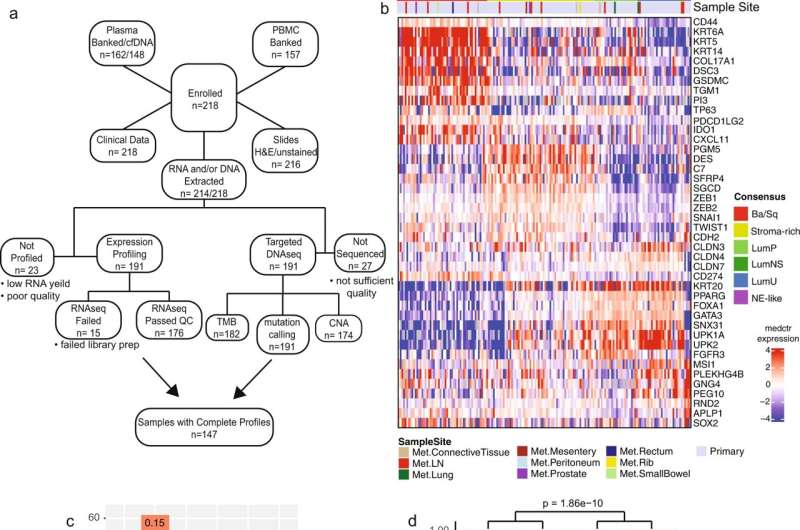
A comprehensive genomic analysis in more than 200 patients with metastatic urothelial carcinomas may help inform how a patient would respond to immunotherapy, report UNC Lineberger Comprehensive Cancer Center researchers and colleagues. About 90% of urothelial carcinomas are bladder cancers. These results, derived from a computational model based on the initial molecular findings of the UC-GENOME study, are published in Nature Communications.
The Bladder Cancer Advocacy Network (BCAN) initiated this multi-institutional nationwide collaboration, which has helped establish a biobank of samples for use by researchers in the field.
When mutations occur in urothelial cells, which line the urinary system, they can develop into urothelial carcinoma, the most common form of bladder cancer. The average age of people diagnosed with bladder cancer is 73; in the U.S. there will be an estimated 81,180 new cases of bladder cancer and about 17,100 deaths in 2022.
“The overarching goal of our study was to provide every patient with metastatic urothelial cancer the opportunity to become an exceptional responder and to develop a rich clinical database and biorepository for future collaborative research efforts,” said Matthew Milowsky, MD, FASCO, the George Gabriel and Frances Gable Villere Distinguished Professor at the UNC School of Medicine and co-corresponding author of the article.
“Most significantly, these findings provide a potential way to predict response to immunotherapies by integrating clinical and molecular features,” said Milowsky, who is also section chief of Genitourinary Oncology in the UNC Division of Oncology and co-director of the Urologic Oncology Program at UNC Lineberger.
UC-GENOME enrolled 218 patients with metastatic urothelial cancer. Based on genetic sequencing analyses of their tumor tissue, 69.3% of people in the study had potential treatment options, but only 5% went on to receive therapy based on their genomic profiles.
“Two of the likely reasons for limited use of sequencing-directed treatment were the absence of FDA-approved targeted therapies at the time of patient accrual and the approval and use of immune checkpoint inhibitor therapy during the course of the study,” said lead author Jeffrey S. Damrauer, Ph.D., Bladder Cancer Research Program manager at UNC Lineberger and who co-led the study with Wolfgang Beckabir, a graduate student in UNC School of Medicine’s MD/Ph.D. program. “We hope, that moving forward, genomically informed decisions can lead to patients being matched with the therapy that gives them a high likelihood to achieve the best outcome.”
Researchers also uncovered a striking finding: one of the molecular subtypes, stroma-rich, was overrepresented in UC-GENOME tumor samples compared with non-metastatic samples. This enrichment suggests that patients with the stroma-rich subtype may have an increased chance of developing metastatic disease.
Through integrating all of the analyses with clinical data, the team also found that a subset of genomic and clinical features could predict whether or not a patient would respond to immunotherapy. While these findings are encouraging to the authors, they state that future work by UNC and others is needed to validate their findings.
UNC Lineberger Comprehensive Cancer Center

